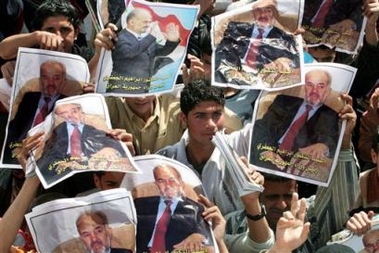An Iraqi vice president called Tuesday for the embattled Shiite prime
minister to step aside so a new government can be formed, becoming the most
senior Shiite official publicly to endorse demands for a leadership change to
halt the slide toward civil war.

Iraqis demonstrate in
support of Iraq's Prime Minister Ibrahim al-Jaafari as they hold his
pictures Tuesday April 4, 2006 in Baghdad, Iraq. Some 2,500 people marched
in support of al-Jaafari in Sadr City, calling for Iraqi leaders to speed
up the formation of the government and carrying banners reading 'Down with
the Conspiracy'. [AP] |
Vice President Adil Abdul-Mahdi told the British Broadcasting Corp. that he
met with Prime Minister Ibrahim al-Jaafari on Monday and urged him to give up
the nomination for a second term because he had lost the confidence of the
Sunnis and Kurds.
But Abdul-Mahdi said al-Jaafari refused, insisting he wanted to take his case
to parliament, which must approve the new prime minister and his Cabinet by a
majority vote.
Asked whether al-Jaafari should withdraw his nomination, Abdul-Mahdi said:
"Yes, after such a time of naming him, not getting approval from others now in
UIA (the dominant Shiite political bloc), there is some rejection so I think he
should step aside."
Abdul-Mahdi lost the prime minister nomination to al-Jaafari in February by a
single vote at a caucus of the Shiite bloc, which won the most seats in
parliamentary elections last December. Al-Jaafari squeaked through largely
because he had the support of the powerful anti-American cleric Muqtada al-Sadr.
Abdul-Mahdi's comment followed the visit of Secretary of State Condoleezza
Rice and British Foreign Secretary Jack Straw, who warned the Iraqis that their
key allies were losing patience with the political stalemate.
U.S. officials have been urging the Iraqis to form a new national unity
government of Shiites, Sunnis and Kurds as a first step toward restoring public
confidence and halting the country's slide toward anarchy. The talks have
stalled over the demands that al-Jaafari be replaced.
President Bush urged the Iraqis on Tuesday to speed up the talks, calling on
elected leaders "to stand up and do their job."
"One way to help bring confidence to the Iraqi people that those few will not
be able to determine the future of that country is for there to be unity
government that steps up and says, `I'm willing to lead,'" Bush said.
Critics blame al-Jaafari for failing to restore order and for the rise in
sectarian tensions. His main critics have been Sunnis and Kurds, but last
weekend two other prominent Shiite politicians also called for him to step aside
as the nominee.
However, Shiite officials fear that replacing him might splinter their
alliance, and a Kurdish politician who opposes al-Jaafari said he feared that
international pressure to remove him might trigger a backlash among Iraqis angry
over foreign influence.
On Tuesday, about 2,500 people marched in support of al-Jaafari in Baghdad's
Sadr City district, carrying banners saying "Down with the Conspiracy" against
their candidate.
Shiite officials have been meeting for several days with Sunni and Kurdish
leaders urging them to soften their opposition to al-Jaafari.
"I think tomorrow, or the day after things will ease up," said Shiite
politician Khudayer al-Khuzai, who backs the prime minister. "They were
understanding the grave repercussions of changing. If al-Jaafari is changed,
then the (Shiite) alliance will split. We cannot abandon him because he was
democratically elected."
Meanwhile, a car bomb exploded Tuesday in a mostly Shiite area of eastern
Baghdad, killing at least 10 people.
The bomb went off in the poor, mostly Shiite area of Habibiyah and damaged
several cars and nearby sandwich stands, police said. Chaos ensued as militants
from radical cleric Muqtada al-Sadr's Mahdi Army militia fired weapons in the
air to clear the crowds.
At least a dozen other Iraqis were killed Tuesday in war-related violence in
Baghdad and central Iraq, police said.
They included a mother and two of her sons, 9 and 12, who died when a bomb
exploded in front of their home in the capital. A third son, age 13, was
wounded, along with two brothers from a different family living in the same
home, police said.
Elsewhere in Baghdad, a receptionist at the United Arab Emirates Embassy and
his friend ¡ª both Iraqis ¡ª were slain as they left the building, police said.
Insurgents have often targeted diplomats and employees of Arab and Muslim
embassies to undermine support for the U.S.-backed government.
Gunmen also killed a judge, an ice cream vendor and his companion and a
policeman in separate slayings in the capital, police said.
In Samarra, 60 miles north of Baghdad, a car bomb exploded near a convoy
carrying the son of a city council member, killing a security guard and a
driver, police said. The council member's son escaped injury.
In southern Iraq, gunmen killed one policeman and wounded another as the two
were driving in the city of Basra, police said. Two mortar rounds exploded near
the British consulate in Basra during a reception, causing no injuries but
forcing the party to end early, an Associated Press reporter at the event said.
Police in Baghdad also found the bodies of four men, apparent victims of
sectarian reprisal killings. It was unclear when they were slain.
The body of a U.S. Marine missing after a weekend vehicle accident was also
recovered Tuesday, the U.S. said. Six U.S. troops were killed and two remain
missing after the Sunday accident in western Iraq.